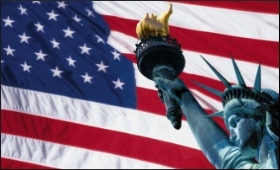|

|
US says it 'fervently' supports India's rise
|
|

|
|
| Top Stories |
 |
|
|
|
Arun Kumar | 12 Mar, 2013
Describing forging deeper partnerships with emerging powers as a key pillar of US strategy for the Asia-Pacific, a top aide of President Barack Obama says Washington not just accepts, but fervently supports India's rise.
"US and Indian interests powerfully converge in the Asia-Pacific, where India has much to give and much to gain," Obama's National Security Advisor Thomas Donilon said discussing US policy in the Asia-Pacific region at Asia Society in New York Monday.
"Southeast Asia begins in Northeast India, and we welcome India's efforts to 'Look East,' from supporting reforms in Burma to trilateral cooperation with Japan to promoting maritime security," he said.
In the past year, for example, India-ASEAN trade increased by 37 percent to $80 billion, Donilon noted.
As part of US strategy for the Asia-Pacific, Donilon noted that Obama "considers US relations with India-the world's largest democracy-to be 'one of the defining partnerships of the twenty-first century.'"
"From Prime Minister (Manmohan) Singh's visit in 2009 to the President's trip to India in 2010, the United States has made clear at every turn that we don't just accept India's rise, we fervently support it," he said.
Donilon said the United States is implementing a comprehensive, multidimensional strategy to pursue its vision in the region "to sustain a stable security environment and a regional order rooted in economic openness, peaceful resolution of disputes, and respect for universal rights and freedoms."
Five key pillars of this strategy were: strengthening alliances; deepening partnerships with emerging powers; building a stable, productive, and constructive relationship with China; empowering regional institutions; and helping to build a regional economic architecture that can sustain shared prosperity.
The Obama Administration has worked to make its rebalance to the Asia-Pacific a reality because the region's success in the century ahead -and the United States' security and prosperity in the 21st century-still depend on the presence and engagement of the United States in Asia, he said.
However rebalancing does not mean diminishing ties to important partners in any other region, containing China or seeking to dictate terms to Asia, Donilon said.
"We are a resident Pacific power, resilient and indispensable," he said asserting during "Obama's second term, this vital, dynamic region will continue to be a strategic priority."
|
|
|
| |
|
|
|
|
|
|
|
|
|
|
|
|
|
|
| |
| Customs Exchange Rates |
| Currency |
Import |
Export |
US Dollar
|
84.35
|
82.60 |
UK Pound
|
106.35
|
102.90 |
Euro
|
92.50
|
89.35 |
| Japanese
Yen |
55.05 |
53.40 |
| As on 12 Oct, 2024 |
|
|
| Daily Poll |
 |
 |
| Do you think Indian businesses will be negatively affected by Trump's America First Policy? |
|
|
|
|
|
| Commented Stories |
 |
|
|
|
|
|
| |
|